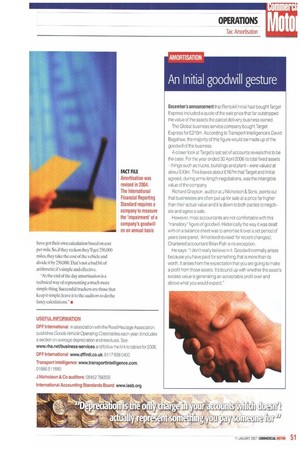An Initial goodwill gesture
Page 51

If you've noticed an error in this article please click here to report it so we can fix it.
December's announcement that Rentokil Initial had bought Target Express included a quote of the sale price that far outstripped the value of the assets the parcel delivery business owned.
The Global business service company bought Target Express for £210m. According to Transport Intelligence's David Bagshaw, the majority of this figure would be made up of the goodwill of the business.
A closer look at Target's last set of accounts reveals this to be the case. For the year ended 30 April 2006 its total fixed assets things such as trucks, buildings and plant — were valued at about £43m. This leaves about £167m that Target and Initial agreed, during arms-length negotiations, was the intangible value of the company.
Richard Grayson, auditor at J Nicholson & Sons, points out that businesses are often put up for sale at a price far higher than their actual value and it is down to both parties to negotiate and agree a sale.
However, most accountants are not comfortable with this "transitory" figure of goodwill. Historically the way it was dealt with on a balance sheet was to amortise it over a set period of years (see panel, 'Amortised revised' for recent changes). Chartered accountant Brian Fish is no exception.
He says: "I don't really believe in it. Goodwill normally arises because you have paid for something that is more than its worth. It arises from the expectation that you are going to make a prof it from those assets. It's bound up with whether the asset's excess value is generating an acceptable profit over and above what you would expect."










































































































































































